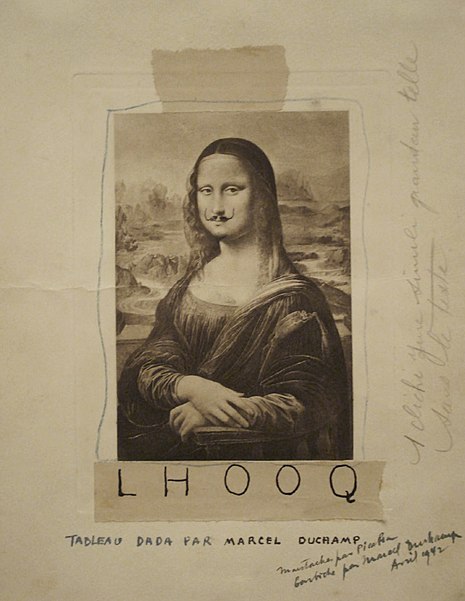Graffiti
List of key words.
In the 20th century it mostly came to be regarded like graffiti: something polite and respectful people did not do.AdvertisementContinue reading the main storyPaul F. Gehl, a curator at the Newberry, blamed generations of librarians and teachers for “inflicting us with the idea” that writing in books makes them “spoiled or damaged.”
“I Vitelloni,” Federico Fellini’s 1953 film about a group of young men on the brink of adulthood drifting about in a small Italian village, to George Lucas before he made “American Graffiti.”
Tom Luddy introduced George Lucas to Federico Fellini's I Vitelloni before he made American Graffiti.
hese questions recall some familiar rhetorical categories of composition, including writing as context, writing as style, writing as signification
when words like "logos", "ethos", and "pathos" suck, remember the graffiti article
https://en.wikipedia.org/wiki/L.H.O.O.Q.
L.H.O.O.Q. is a Marcel Duchamp readymade artwork conceived in 1919. The work consists of a cheap postcard reproduction of Da Vinci's Mona Lisa (the found object or objet trouvé), "improved" by Duchamp with the addition of a penciled in moustache and a goatee with the title drawn in large capital letters underneath.

L.H.O.O.Q. is a pun whose letters pronounced one at a time in French sound like "Elle a chaud au cul". This translates variously as "She is hot in the arse" or "She has a hot ass". "Avoir chaud au cul" is a vulgar expression implying that a woman has sexual restlessness. Duchamp, in an interview, gave a loose translation of L.H.O.O.Q. as "there is fire down below". (Schwarz 203)
Was the the original artistic source for the long string of childhood pranks in which children were often seen marking up and defacing pictures in books and magazines? Were there others prior?
given that I was in Nashville to talk with teens about how technology had changed their lives.
I have to wonder who the sociologists were from the 60's that interviewed teens about how the telephone changed their lives. Or perhaps the 70's sociologist who interviewed kids about how cars changed their lives? Certainly it wasn't George Lucas' American Graffiti that informed everyone of the issues?
If your work withers under Audrey’s critical gaze, you’ve got more work to do.
Audrey Watters blocked Genius and Hypothesis from her blog on Apr 2017: http://hackeducation.com/2017/04/26/no-annotations-thanks-bye
Audrey Watters
It's fun (?) that a few months before Nate Angell published in the Hypothesis' blog that Hypothesis was doing pretty well with the Audrey Watters' Test for Educational Technology.
Similar to the art renaissance that encompassed southern neighbor Brazil 10 years ago — which was bolstered by a blossoming economy and growing middle class, Colombia’s artistically fertile environment has art dealers, curators, academics and the artists themselves fostering a creative conscience.Within Colombia's boom, street art has emerged as a popular medium.